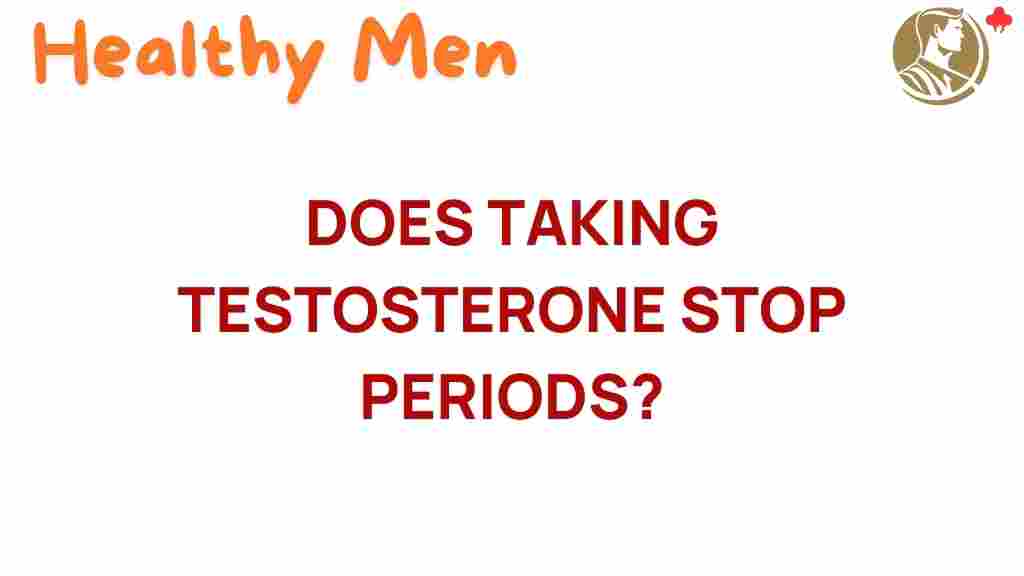The Impact of Testosterone: Does it Halt Monthly Cycles?
Testosterone is often associated with men’s health and vitality, but it plays a crucial role in women’s health as well. Understanding its impact on the menstrual cycle can provide valuable insights into women’s reproductive systems and overall health. In this article, we will explore how testosterone influences menstruation, the effects of hormonal therapy, and the implications for women experiencing changes in their hormone levels.
Understanding Testosterone and Its Role in Women’s Health
Testosterone is a hormone that is produced in both men and women, albeit in different quantities. In women, testosterone is primarily produced in the ovaries, adrenal glands, and peripheral tissues. While it is often considered a ‘male hormone,’ it is vital for maintaining women’s health, influencing various bodily functions, including:
- Muscle mass and strength
- Bone density
- Sexual function and libido
- Energy levels
- Mood regulation
Normal testosterone levels in women range between 15 to 70 ng/dL, and variations can lead to significant health effects. Understanding the balance of hormones is essential, especially when considering hormonal therapy for conditions such as menopause or other hormonal imbalances.
The Menstrual Cycle and Hormone Levels
The menstrual cycle is a complex interplay of hormones, primarily estrogen and progesterone, which regulate menstruation. However, testosterone also plays a role in this cycle. The menstrual cycle can be divided into four main phases:
- Menstrual Phase: Shedding of the uterine lining, typically lasting 3-7 days.
- Follicular Phase: Begins on the first day of menstruation and ends with ovulation. Hormones stimulate the growth of ovarian follicles.
- Ovulation: Release of an egg from the ovary, triggered by a surge in luteinizing hormone (LH).
- Luteal Phase: After ovulation, progesterone levels rise to prepare the uterus for potential pregnancy.
Throughout these phases, testosterone levels can fluctuate. Elevated testosterone levels during certain phases may affect the regularity of the menstrual cycle, potentially leading to changes in menstruation.
The Effects of Testosterone on the Menstrual Cycle
When testosterone levels become imbalanced, they can lead to several reproductive issues. Here are some of the health effects associated with elevated testosterone in women:
- Amenorrhea: A condition where menstruation stops entirely. High testosterone levels can disrupt the hormonal balance necessary for regular cycles.
- Irregular Periods: Women may experience variations in cycle length, leading to irregular menstruation.
- Polycystic Ovary Syndrome (PCOS): This condition is characterized by high levels of androgens, including testosterone, which can lead to missed or irregular periods.
- Excessive Hair Growth: Elevated testosterone can cause hirsutism, leading to unwanted hair growth in women.
- Weight Gain: Hormonal imbalances can also affect metabolism and lead to weight gain, further complicating menstrual health.
These health effects underline the importance of monitoring testosterone levels in women, particularly for those experiencing reproductive or menstrual issues.
Hormonal Therapy and Testosterone
Hormonal therapy can be an effective treatment for women experiencing hormonal imbalances, including low testosterone levels. This therapy can help restore balance and alleviate symptoms associated with low hormone levels. Here are some common types of hormonal therapy:
- Testosterone Replacement Therapy (TRT): Used to treat low testosterone levels, this therapy may help improve energy, libido, and overall well-being.
- Combined Hormonal Contraceptives: These can regulate hormone levels and manage symptoms related to irregular menstruation.
- Anti-Androgens: Medications that block the effects of testosterone can be beneficial for women with conditions like PCOS.
However, it is essential to consult a healthcare provider before starting any hormonal therapy, as there can be risks and side effects associated with altering hormone levels.
Step-by-Step Process: Managing Hormonal Imbalances
If you suspect that testosterone levels are affecting your menstrual cycle, consider the following steps:
1. Consult a Healthcare Provider
Seek advice from a healthcare professional who specializes in women’s health. They can perform necessary tests to evaluate your hormone levels.
2. Get Tested
Blood tests can help determine your testosterone levels and assess whether they are within the normal range.
3. Discuss Symptoms
Be open about any symptoms you are experiencing, such as irregular periods, weight changes, or excessive hair growth. This information can help guide treatment options.
4. Explore Treatment Options
Based on your test results and symptoms, your healthcare provider may recommend lifestyle changes, medication, or hormonal therapy.
5. Monitor Progress
After starting any treatment, regularly follow up with your provider to monitor your hormone levels and menstrual cycle changes.
Troubleshooting Tips for Hormonal Imbalances
If you are experiencing difficulties with your menstrual cycle and suspect testosterone-related issues, consider these troubleshooting tips:
- Maintain a Healthy Diet: A balanced diet can support hormone balance. Focus on whole foods, including fruits, vegetables, lean proteins, and healthy fats.
- Exercise Regularly: Physical activity can help regulate hormone levels and improve overall health.
- Manage Stress: High stress can lead to hormonal imbalances. Incorporate stress-reducing techniques such as meditation, yoga, or deep breathing exercises.
- Keep a Menstrual Diary: Tracking your menstrual cycle can help identify patterns and changes related to hormone levels.
For more information on hormonal therapy and its effects on women’s health, visit this resource.
Conclusion
Testosterone plays a significant role in women’s health, influencing the menstrual cycle and overall well-being. An imbalance in testosterone levels can lead to various health effects, including disruptions in menstruation. Understanding the impact of testosterone is essential for women seeking to manage their reproductive health.
By consulting with healthcare professionals, exploring hormonal therapy options, and adopting healthy lifestyle choices, women can effectively navigate hormonal changes and maintain a healthy menstrual cycle. Remember, proactive management of hormone levels is key to optimal women’s health and reproductive system function.
For further reading on women’s hormonal health, check out this article.
This article is in the category Conditions and created by healthymen Team
